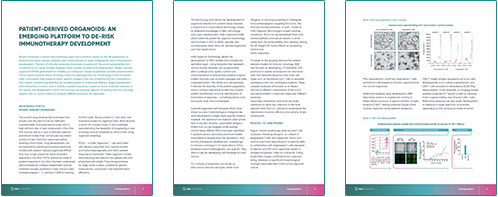CASE STUDY
Advancing immunotherapy for solid tumors with patient-derived organoids
Case studies and expert insights on the role of HUB Organoids in advancing immunotherapy for solid tumors

Approved cell therapies have demonstrated success in treating hematological malignancies by targeting specific markers. However, this approach has proven ineffective in treating solid tumors due to the absence of tumor-associated antigens (TAAs) that can be targeted without harming normal tissue. Preclinical models currently in use do not accurately replicate TAA expression, thus hindering progress in therapeutic development. Patient-derived HUB Organoids provide a solution by preserving both patient heterogeneity and specific TAAs, which are critical factors for advancing cell therapies for solid tumors. Co-cultures of these organoids offer a valuable tool for investigating the targeting of tumors, the immune microenvironment, or both, in immunotherapeutic research.
To meet the growing demand for patient-derived models in immuno-oncology, HUB has prioritized the development of I-O biobanks, encompassing protocols for isolating and expanding various cell types, including tumor cells, fibroblasts, and T cells, to establish autologous and non-autologous systems.
Download our case study to gain in-depth insights into:
- The significance of PDOs in the development of immunotherapy drugs for solid tumors
- Scientific findings from two case studies illustrating the effectiveness of organoid-based immune cell co-cultures in assessing the efficacy and toxicity of IO agents
- An interview featuring our CSO, Dr. Sylvia Boj, and Dr. Andrea Bisso, the director of pharmacology at Gadeta*, addressing crucial questions for researchers interested in utilizing patient-derived organoids for immunotherapy drug development
Sample pages

*The following content was created in collaboration with Gadeta. We extend our gratitude for their contribution and expertise in developing this material
